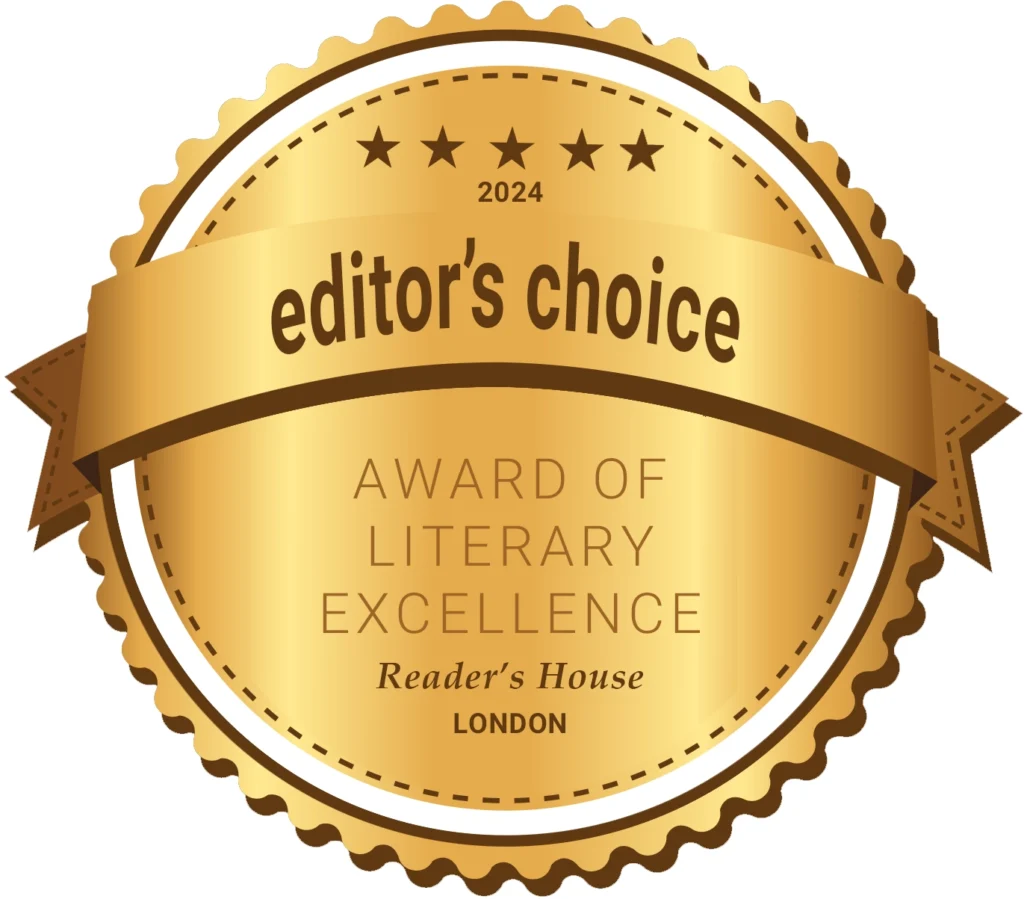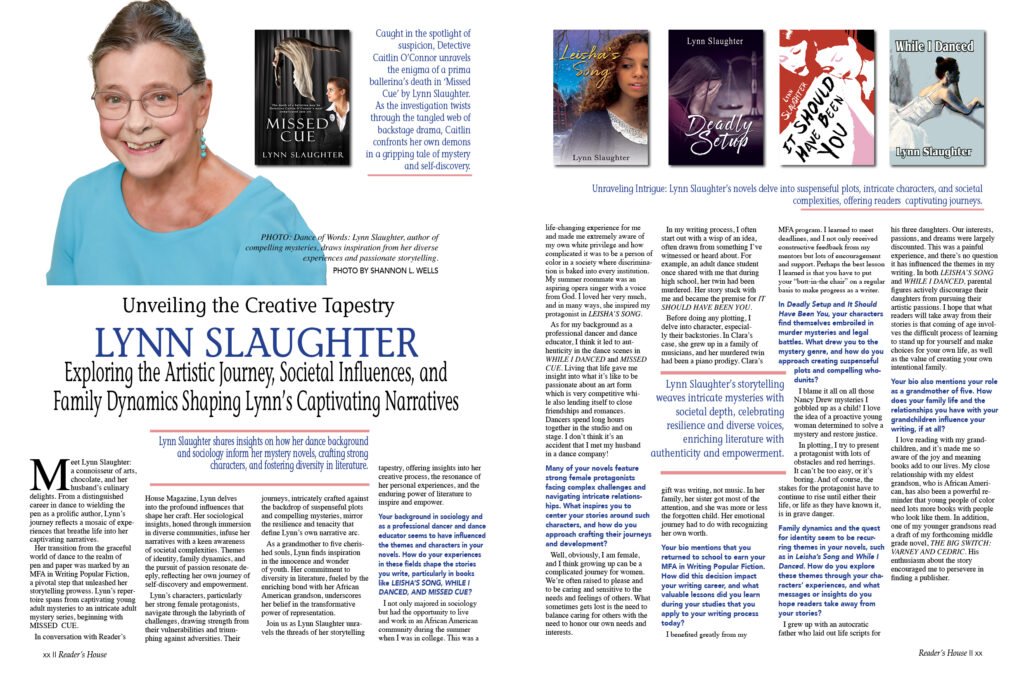Exploring the Artistic Journey, Societal Influences, and Family Dynamics Shaping Lynn’s Captivating Narratives
Lynn Slaughter shares insights on how her dance background and sociology inform her mystery novels, crafting strong
characters, and fostering diversity in literature.
Meet Lynn Slaughter: a connoisseur of arts, chocolate, and her husband’s culinary delights. From a distinguished career in dance to wielding the pen as a prolific author, Lynn’s journey reflects a mosaic of experiences that breathe life into her captivating narratives.
Her transition from the graceful world of dance to the realm of pen and paper was marked by an MFA in Writing Popular Fiction, a pivotal step that unleashed her storytelling prowess. Lynn’s repertoire spans from captivating young adult mysteries to an intricate adult mystery series, beginning with MISSED CUE.
In conversation with Reader’s House Magazine, Lynn delves into the profound influences that shape her craft. Her sociological insights, honed through immersion in diverse communities, infuse her narratives with a keen awareness of societal complexities. Themes of identity, family dynamics, and the pursuit of passion resonate deeply, reflecting her own journey of self-discovery and empowerment.
Lynn’s characters, particularly her strong female protagonists, navigate through the labyrinth of challenges, drawing strength from their vulnerabilities and triumphing against adversities. Their journeys, intricately crafted against the backdrop of suspenseful plots and compelling mysteries, mirror the resilience and tenacity that define Lynn’s own narrative arc.
As a grandmother to five cherished souls, Lynn finds inspiration in the innocence and wonder of youth. Her commitment to diversity in literature, fueled by the enriching bond with her African American grandson, underscores her belief in the transformative power of representation.
Join us as Lynn Slaughter unravels the threads of her storytelling tapestry, offering insights into her creative process, the resonance of her personal experiences, and the enduring power of literature to inspire and empower.
Your background in sociology and as a professional dancer and dance educator seems to have influenced the themes and characters in your novels. How do your experiences in these fields shape the stories you write, particularly in books like LEISHA’S SONG, WHILE I DANCED, and MISSED CUE?
I not only majored in sociology but had the opportunity to live and work in an African American community during the summer when I was in college. This was a life-changing experience for me and made me extremely aware of my own white privilege and how complicated it was to be a person of color in a society where discrimination is baked into every institution. My summer roommate was an aspiring opera singer with a voice from God. I loved her very much, and in many ways, she inspired my protagonist in LEISHA’S SONG.
As for my background as a professional dancer and dance educator, I think it led to authenticity in the dance scenes in WHILE I DANCED and MISSED CUE. Living that life gave me insight into what it’s like to be passionate about an art form which is very competitive while also lending itself to close friendships and romances. Dancers spend long hours together in the studio and on stage. I don’t think it’s an accident that I met my husband in a dance company!
Many of your novels feature strong female protagonists facing complex challenges and navigating intricate relationships. What inspires you to center your stories around such characters, and how do you approach crafting their journeys and development?
Well, obviously, I am female, and I think growing up can be a complicated journey for women. We’re often raised to please and to be caring and sensitive to the needs and feelings of others. What sometimes gets lost is the need to balance caring for others with the need to honor our own needs and interests.
In my writing process, I often start out with a wisp of an idea, often drawn from something I’ve witnessed or heard about. For example, an adult dance student once shared with me that during high school, her twin had been murdered. Her story stuck with me and became the premise for IT SHOULD HAVE BEEN YOU.
Before doing any plotting, I delve into character, especially their backstories. In Clara’s case, she grew up in a family of musicians, and her murdered twin had been a piano prodigy. Clara’s gift was writing, not music. In her family, her sister got most of the attention, and she was more or less the forgotten child. Her emotional journey had to do with recognizing her own worth.
Your bio mentions that you returned to school to earn your MFA in Writing Popular Fiction. How did this decision impact your writing career, and what valuable lessons did you learn during your studies that you apply to your writing process today?
I benefited greatly from my MFA program. I learned to meet deadlines, and I not only received constructive feedback from my mentors but lots of encouragement and support. Perhaps the best lesson I learned is that you have to put your “butt-in-the chair” on a regular basis to make progress as a writer.
In Deadly Setup and It Should Have Been You, your characters find themselves embroiled in murder mysteries and legal battles. What drew you to the mystery genre, and how do you approach creating suspenseful plots and compelling whodunits?
I blame it all on all those Nancy Drew mysteries I gobbled up as a child! I love the idea of a proactive young woman determined to solve a mystery and restore justice.
In plotting, I try to present a protagonist with lots of obstacles and red herrings. It can’t be too easy, or it’s boring. And of course, the stakes for the protagonist have to continue to rise until either their life, or life as they have known it, is in grave danger.
Family dynamics and the quest for identity seem to be recurring themes in your novels, such as in Leisha’s Song and While I Danced. How do you explore these themes through your characters’ experiences, and what messages or insights do you hope readers take away from your stories?
I grew up with an autocratic father who laid out life scripts for his three daughters. Our interests, passions, and dreams were largely discounted. This was a painful experience, and there’s no question it has influenced the themes in my writing. In both LEISHA’S SONG and WHILE I DANCED, parental figures actively discourage their daughters from pursuing their artistic passions. I hope that what readers will take away from their stories is that coming of age involves the difficult process of learning to stand up for yourself and make choices for your own life, as well as the value of creating your own intentional family.
Your bio also mentions your role as a grandmother of five. How does your family life and the relationships you have with your grandchildren influence your writing, if at all?
I love reading with my grand-
children, and it’s made me so aware of the joy and meaning books add to our lives. My close relationship with my eldest
grandson, who is African American, has also been a powerful reminder that young people of color need lots more books with people who look like them. In addition, one of my younger grandsons read a draft of my forthcoming middle grade novel, THE BIG SWITCH: VARNEY AND CEDRIC. His enthusiasm about the story
encouraged me to persevere in finding a publisher.
Follow the Author
- Website: https://lynnslaughter.com
- Amazon: https://Amazon.com/author/lynnslaughter
- Goodreads: https://www.goodreads.com/lynnslaughter
- X: https://twitter.com/lslaughter2




